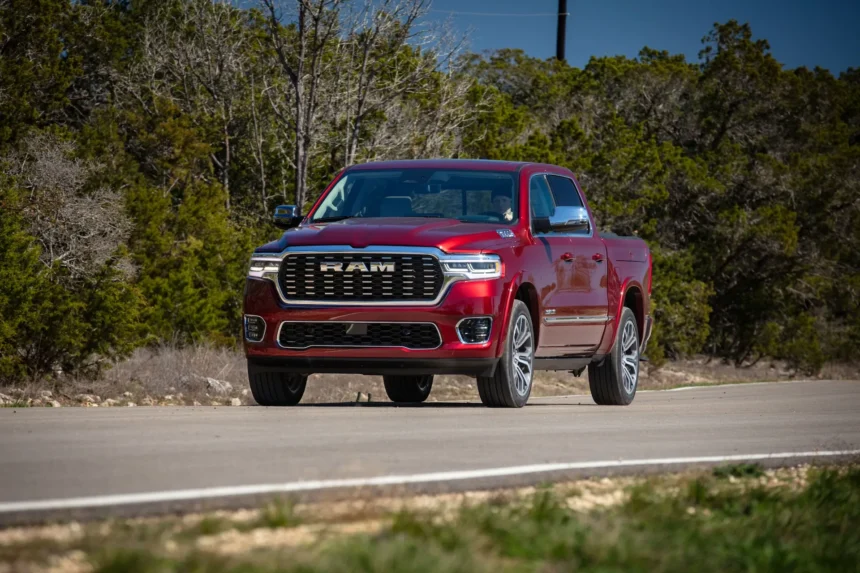Ram has made a significant change this year by replacing its V-8 and turbodiesel engines with a twin-turbocharged inline-6 engine. This new engine is not only stronger but also smoother than its predecessors. The Ram 1500 retains its coil-sprung suspension and available air springs, which have always set it apart from the competition. In terms of performance, the Ram 1500 earns a solid 7 rating, with points given for its ride quality and off-road and towing capabilities.
The Ram 1500 offers a versatile driving experience with different modes available depending on the trim level. Lower-end models come with a simple part-time setup, while higher-end models feature a convenient automatic mode that can be used on any type of terrain. The high-output versions of the Ram 1500 have a variable torque split that biases power to the rear wheels, making it ideal for off-road driving or towing heavy loads.
The Ram 1500 Rebel is equipped with 33-inch Goodyear Wrangler tires, a raised ride height, and a lifted suspension with Bilstein shocks, providing a rugged and capable off-road experience. The RHO model takes things a step further with 35-inch all-terrain tires, Bilstein e2 Blackhawk remote reservoir dampers, stronger springs, and launch control for even more performance.
In terms of speed, the Ram 1500 is impressively quick. The base models come with a 3.6-liter V-6 engine that features a mild-hybrid starter-generator for improved efficiency. The higher-end models are equipped with a 3.0-liter twin-turbo inline-6 engine that delivers more power and torque, making it a better choice for off-the-line acceleration. The high-output turbo-6 engine produces a whopping 540 hp and 521 lb-ft of torque, providing strong and smooth power delivery.
When it comes to handling, the Ram 1500 stands out with its rear coil springs, which offer a more comfortable and planted ride compared to leaf springs. Air springs are available as an option on select models, further enhancing the truck’s ride quality and off-road capabilities. The RHO model has the most comfortable ride and is the most capable off-road, thanks to its advanced suspension and large all-terrain tires.
Overall, the Ram 1500 offers a versatile and capable driving experience, with a range of engine options, trim levels, and features to suit every driver’s needs. Its performance, handling, and off-road capabilities make it one of the most capable light-duty trucks on the market. Whether you’re looking for a workhorse or an off-road adventurer, the Ram 1500 has you covered. The world of technology is constantly evolving, with new innovations and advancements being made every day. One of the most exciting developments in recent years is the rise of artificial intelligence (AI). AI is a branch of computer science that aims to create machines that can perform tasks that typically require human intelligence, such as learning, reasoning, and problem-solving.
One of the key areas where AI is making a significant impact is in the field of healthcare. AI has the potential to revolutionize the way we diagnose and treat diseases, making healthcare more efficient and effective. One of the most promising applications of AI in healthcare is in medical imaging. AI-powered imaging tools can analyze medical images, such as X-rays, MRIs, and CT scans, with greater accuracy and speed than human radiologists. This can help doctors detect diseases earlier, leading to better outcomes for patients.
AI is also being used in drug discovery and development. By analyzing large amounts of data, AI algorithms can identify potential drug candidates faster than traditional methods. This can help pharmaceutical companies bring new drugs to market more quickly, benefiting patients in need of life-saving treatments.
In addition to medical imaging and drug discovery, AI is also being used in personalized medicine. By analyzing a patient’s genetic information, AI algorithms can help doctors tailor treatments to individual patients, maximizing their effectiveness and minimizing side effects.
Despite the many benefits of AI in healthcare, there are also challenges that need to be addressed. One of the main concerns is the potential for bias in AI algorithms. If the data used to train these algorithms is not representative of the population, they can produce biased results that may harm certain groups of patients. It is important for developers to ensure that AI algorithms are trained on diverse and representative data sets to avoid bias.
Another challenge is the ethical implications of using AI in healthcare. For example, who is responsible if an AI algorithm makes a wrong diagnosis? How can we ensure patient privacy and data security when using AI tools? These are important questions that need to be addressed as AI becomes more prevalent in healthcare.
Overall, AI has the potential to transform healthcare in many positive ways. From improving medical imaging to speeding up drug discovery, AI is revolutionizing the healthcare industry. By addressing the challenges and ethical concerns associated with AI, we can harness its power to improve patient outcomes and enhance the practice of medicine.






